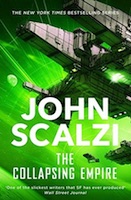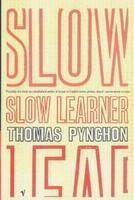 What do you call a human Empire, spread out across a number of star systems, and set up so each system relies an all or most of the others for survival? With an Emperor (sorry, Emperox, gender neutral term) at its centre, a trade guild/house system ruling it together with a Church, and a society in what amounts to a caste system? Thriving? (well, yes). Wealthy? (yes, albeit much more true for the top layer). Corrupt? (oh, certainly).
What do you call a human Empire, spread out across a number of star systems, and set up so each system relies an all or most of the others for survival? With an Emperor (sorry, Emperox, gender neutral term) at its centre, a trade guild/house system ruling it together with a Church, and a society in what amounts to a caste system? Thriving? (well, yes). Wealthy? (yes, albeit much more true for the top layer). Corrupt? (oh, certainly).
But more to the point, this first book in John Scalzi's new Interdependency series, The Collapsing Empire, also adds 'Endangered - due to its reliance on the little-understood Flow links which tie this Empire together' to the list of attributes. Never mind the fact that this could mean the end of humanity as they know it...
There's more to be added here, but I really don't want to spoil a book which you should read for yourself! But let's just say that the title alone has at least two meanings.
John Scalzi is an American SF writer, who has been entertaining the readers with his tales since 2005, and has won Hugo, Locus, Campbell, and Seiun awards for his work during that time. He is a former president of the SFWA and was (to some extent still is) an exponent in the last few rounds of politics in the SF community (e.g - google Puppygate if you like non-edifying squabbling). He also writes non-fiction, and regularly blogs on whatever.scalzi.com on a wide variety of topics.
The Collapsing Empire, out for a few weeks as I'm writing this (yes, I'm behind. Sorry.) kicked off the new Interdependency series in style: Scalzi summarised it as “Sales records broken, bestseller status achieved, and TV deal gotten”. Way to go...
The book kicks off with a little opening action sequence on the ship Tell Me Another One which, whilst on its way to End (the system where the Empire sends its criminals, one way, ie some kind in Intergalactic Australia ;-) both goes through a mutiny, mainly for personal gain, but also unexpectedly drops out of the Flow which is becoming notably less reliable, a sign of things to come. It neatly wraps the reader into the story whilst introducing a number of concepts rather key to the rest of the book, without lengthy info dumps and explanations (there's very little in the book which actually feels like the reader is having things explained to him/her except maybe in the briefings to Cardenia, the new Emperox...).
On a note - the naming of the ships is whimsical, and reminiscent of Banks (Yes Sir, That's My Baby; Tell Me Another One; No Sir, I Don't Mean Maybe;...) if not nearly as gnomic in character or naming as the Culture ones.
But in parallel to the above, and yet unknown to the crew of the ship (Scalzi's nod to Causality and event cones, even if this is obviously rather screwy in a universe with travel shortcuts amounting to FTL), the old Emperox dies, and is replaced by his daughter, Cardenia aka Emperox Grayland II. Cardenia was not raised to be Emperox, and only dropped into the role, not completely willingly, when her brother was killed in an accident. I was impressed how Scalzi managed to depict the Cardenia/Bactrin scenes whilst the old Emperox is dying without making them either soppy or toe-curling to read – great writing, that!
Things also are not allowed to settle – already during the coronation there is a first attempt on the life of the new Emperox, incidentally killing off one of the characters I really liked having around... Generally it does not pay to get overly attached to characters – on the one hand Scalzi is wont to kill them off, and on the other they might only have been there for the purpose od exhibition, and might never again re-enter the story! With some notable exceptions, of course.
The universe Scalzi sets this new series in is interesting, and decidedly a Space Opera one... the Interdependency consists of 47 planets/systems, linked together by the flow, with its centre at Hub (both of the Flow, and thus the Empire). Most of these systems are not great for living on, inimical to human life, but given the reliance on where the Flow links go humanity cannot be picky. The only place where life on the surface is viable is End, the system furthest from Hub, the Empire's Penal Colony. The link to Earth, plus to another system, was lost millennia ago. The general fragility of the systems, and the fact that they cannot really stand on their own gives the Interdependency its (obvious) name. But of course there's more to it than something that simple...
One of the key strands driving the first part of the book is that Count Claremont, sent to End to (surreptiously) study the changes to the Flow, detects that he collapse of the system is imminent, and tries to notify the Emperox of this – whilst there is a civil war going on (a recurring event on End), and one of the more powerful houses is pulling strings to its own ends...
The story leaves the reader with some big questions – like, what is the House Nonehampton playing for with all its machinations? Why was the Interdependency set up like this? Why does one of the previous Emperoxes, in the Memory Room containing the memories of all prevoous Emperoxes, call the Empire a Scam? And what is Kiva's role in all of this?
Ah, Kiva. One of the key owners of House Lagos. Developing into some kind of Joker or potential future linchpin as the story unfolds. She is refreshing in being, in this very political environment, smart but rude, and not giving a toss about being exceedingly straight forward. Being herself. Apparently Scalzi had fun writing her, and she's actually quite fun to read, most of the time. And I cannot shake the feeling that he is setting her up as a key piece in the game... not really a pawn levelling up, but rather a knight, except that those are not straight forward in Chess, of course.
The book closes with an epilogue which very directly sets up the next instalment (Scalzi is prone to some foreshadowing and less than subtle hints and pointers throughout), so far without an official title or a release date. We also don't know yet to how many books the series is planned to run to.
I presume the ePub formatting issues which drove me round the bend are limited to the eARC only – but boy were parts of this book hard to read!
Overall a cracking opener to the new series, and a must-read for fans of cleverly structured Space Opera.
More John Scalzi
Title: The Collapsing Empire
Author: John Scalzi
Series: The Interdependency
Series Number: 1
Reviewer: Markus
Reviewer URL: http://thierstein.net
Publisher: TOR
Publisher URL: http://www.panmacmillan.com
Publication Date: March 2017
Review Date: 170414
ISBN: 9781509835072
Pages: 336
Format: ePub/HB
Topic: Space Opera
Topic: Imperial Politics
Thanks to the publisher for the review copy.













